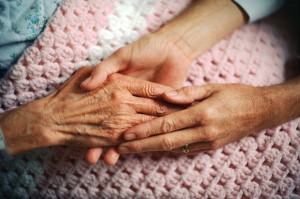 Somewhere along the expanse of rails from New Haven to New York, as I daydreamed during the two-hour train ride to visit my dad in the hospital and take my mom back to the apartment, I realized the accuracy of the term “sandwich generation.” This was my second weekend trip to New York in so many days, leaving behind my wife and two young children and their baseball games as I set out to care for my parents. I was caught between two generations who needed my time and attention, unsure if my divided efforts were doing much good for either.
Somewhere along the expanse of rails from New Haven to New York, as I daydreamed during the two-hour train ride to visit my dad in the hospital and take my mom back to the apartment, I realized the accuracy of the term “sandwich generation.” This was my second weekend trip to New York in so many days, leaving behind my wife and two young children and their baseball games as I set out to care for my parents. I was caught between two generations who needed my time and attention, unsure if my divided efforts were doing much good for either.
This is not the type of column that I had planned to write on Mother’s Day, when I should be praising the goodness and sacrifices of my mom for giving birth to me on the hottest day of 1957, and thanking my wife for taking me as her husband and continuing to put up with me. Those sentiments will be expressed in person. But since so many Baby Boomers like me today find themselves in a “sandwich,” perhaps a few thoughts on the topic might hit a common chord.
It is easy for sandwichers to feel sorry for themselves, but the first thing we should realize is that we are blessed. It is not the sweet blessing of spiritual ecstasy, for sure, or even the more common feeling of accomplishment for a job well done, because our duties are far from finished. The fact is, we are often stretched by travel, exhausted by long hours, with our patience worn thin by listening to our parents repeat the same story over and over from a failing memory, or repeating the same thing again and again to our own kids, who aren’t listening because we haven’t been around as much to engage them.
No, we are not blessed in the sense of a better or more satisfying life. The blessing comes from knowing what we do not always feel – that God has placed us here, between our aging parents and our growing children, for a reason, and for our good and theirs.
Perhaps by our double duty we are kept from the frivolous diversions of our hyper-media culture, and if left to a free weekend would waste time with TV, internet and video games. Or perhaps the exhaustion of tending to two families keeps us from some enticing sin of the flesh or “adultery” of the eye and mind. Or else knowing that we are needed builds up our self-image in a good way, while realizing how little we can do to change the fact of aging keeps us humble. Or we come to recognize the dignity of the human person in our father, who struggles to the bathroom on his own because he hates adult diapers. And when we come home, we really long to see our wife and kids, appreciate the gift of their love and try to make up for the time away.
We are saved by the struggle and the work and the hope we build against the stubborn fact of physical decline and death. But we are also saved from our natural presumption of good health. Watching our parents age and weaken keeps us close to our own mortality, and if we’re wise, we remain mindful of the four last things: death, judgment, heaven, hell.
I was privileged to be present when my dad received the Sacrament of Anointing, and witnessed the real emotional, spiritual and even physical renewal that followed. I relate this experience to my sons, who at their young ages are sobered by the possibility of granddad dying; but through my witness they are also initiated and awakened into the faith that reaches beyond the grave.
My dad, at 87, is recovering from his infection and will be back with my mom at their apartment for Mother’s Day. Their three sons and grandchildren will stop by at some point over the weekend to say hello and share the joy of love and family. The sandwich generation may be stressed, but our efforts are well worth it, especially if we realize that in serving two generations, we are doubly blessed.



